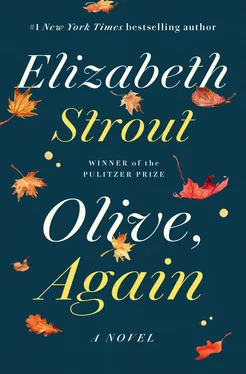Stepping back, Denny brought out his phone and called 911. He told the woman who answered where he was and what he was looking at, and the dispatcher said, “We’ll have someone right there, sir. Stay on the line with me.” He could hear her speaking—into another phone?—and he could hear static and clicks and he waited. “Okay, sir. Do you know if the man is alive?”
“He moaned,” Denny said.
“Okay, sir.”
And then very shortly—it seemed to Denny—a police car with its blue lights flashing drove right up, and two cops got out of the car. They were calm, Denny noticed, and they spoke to him briefly, then went to the man who was draped across the back of the bench. “Drugs,” said one of the policemen, and the other said, “Yep.”
One of the policemen reached into his pocket and brought out a syringe, and he steadily, quickly, pulled up the sleeve of the man’s jacket and injected the man, in his arm, in the crook of his elbow, and very soon the man stood up. He looked around.
It was the Woodcock boy.
Denny would not have recognized him, except that his eyes, deep-set on a handsome face, looked at Denny and said, “Hey, hi.” Then his eyes rolled up for a moment, and the policemen had him sit down on the bench. He was not a boy any longer—he was a middle-aged man—yet Denny could think of him only as a kid in his daughter’s class years ago. How had he turned into this person? Large—fat—with his longish hair and all doped up? Denny stayed where he was, looking at the back of the fellow’s head, and then an ambulance drove up, siren screaming and lights flashing, and within moments two EMT men jumped out and spoke to the policemen, one of the policemen saying, Yes, he had injected him with Naloxone right away. The two EMT men took the Woodcock boy’s arms and walked him into the ambulance; the door shut.
As the ambulance drove away, one of the policemen said to Denny, “Well, you saved a life tonight,” and the other policeman said, getting into the car, “For now.”
Denny walked home quickly, and he thought: It was not his children at all. This seemed to come to him clearly. His children had been safe in their childhood home, not like poor Dorie. His children were not on drugs. It was himself about which something was wrong. He had been saddened by the waning of his life, and yet it was not over.
Hurriedly he went up the steps to his house, tossing his coat off, and in the bedroom Marie was awake, reading. Her face brightened when she saw him. She put her book down on the bed and waved her hand at him. “Hi there,” she said.
It was November.
No snow had fallen yet in Crosby, Maine, and because the sun was out on this particular Wednesday there was a kind of horrifying beauty to the world: The oak trees held their leaves, golden and shriveled, and the evergreens stood at attention as though cold, but the other trees were bare and dark-limbed, stretching into the sky with dwindling spikiness, and the roads were bare, and the fields were swept clean-looking, everything sort of ghastly and absolutely gorgeous with the sunlight that fell at an angle, never reaching the top of the sky. The sky was a darkish blue.
Jack Kennison suggested to Olive Kitteridge that they take a ride in the car. “Oh, I love rides,” she said, and he said he knew that, he was suggesting a ride to make her happy. “I’m happy,” she said, and he said he was too. So they got into their new Subaru—Olive didn’t care for his sports car—and off they went; they decided to head for Shirley Falls, an hour away, where Olive had gone to high school, and where her first husband, Henry, had come from.
Jack and Olive had been together now for five years; Jack was seventy-nine and Olive seventy-eight. The first months, they had slept holding each other. Neither one of them had held another person in bed all night for years. When Jack had been able to be away with Elaine, they sort of held each other at night in whatever hotel they were in, but it was not the same as what he and Olive did their first months together. Olive would put her leg over both of his, she would put her head on his chest, and during the night they would shift, but always they were holding each other, and Jack thought of their large old bodies, shipwrecked, thrown up upon the shore—and how they held on for dear life!
He would never have imagined it. The Olive-ness of her, the neediness of himself; never in his life would he have imagined that he would spend his final years with such a woman in such a way.
It’s that he could be himself with her. This is what he thought during those first number of months with a sleeping, slightly snoring Olive in his arms; this is what he still thought.
She irritated him.
She would not have breakfast, but would get going right away, as if she had things to do. “Olive, you don’t have anything to do,” he would say. And she thumbed her nose at him. Thumbed her nose. God.
It was not until after they married that he began to understand that her anxiety level was high. She rocked her foot constantly as she sat in her chair, she would suddenly leave the house, saying she had to buy some fabric at the Joann fabric store, and she would be gone within moments. But she still clung to him at night, and he still clung to her. And then after another year they did not cling to each other at night but shared the bed and argued about who had taken the blankets during the night; they were really a married couple. And she had grown increasingly less anxious; quietly, this made Jack feel wonderful.
But a couple of years ago they had gone to Miami and Olive hated it. “What are we supposed to do, just sit in the sun?” she had demanded, and Jack took her point; they came home. Last year they had gone to Norway on a cruise around the fjords and they had liked that a great deal better. These days taking a drive was what they both enjoyed. “Like a couple of old farts,” Jack had said during their last drive, and Olive said, “Jack, you know I hate that word.”
—
They drove along now, leaving the town of Crosby, Maine, behind; they drove past the little field with the stone wall and the rocks that showed through the pale grass. “Well,” Olive said. “Edith fell off the pot and broke her arm, so they had to take her away.”
“Take her away?” Jack asked; he glanced over at her.
“Oh, you know.” Olive wiggled her hand through the air. “Off to rehab, or wherever.”
“Is she going to be all right?”
“Dunno. Suspect so.” Olive looked out her window; they were entering the town of Bellfield Corners. “God,” she said, “is this town sad.” Jack agreed that the town was sad. Only one diner was open on Main Street, and there was a credit union, and a gas station. Everything else was closed down. Even the mill, which you used to see when you first came into town, had been torn down in the last ten years; Olive told this to Jack.
“I’ve never been to Shirley Falls,” Jack said as they drove out of the town of Bellfield Corners onto the open road once more.
Olive moved so that her back was almost against the car door, and she looked at Jack. “Are you kidding me?” she said. “You have never been to Shirley Falls?”
“Why would I have been to Shirley Falls?” Jack asked. “What’s in Shirley Falls these days? Oh, I know it was important, way back in the day, but what’s there now?”
“Somalis,” said Olive, turning forward once more.
“Oh, right,” Jack said. “I forgot about them.” Then he said, “Okay, I didn’t forget about them, I just haven’t thought about them for a while.”
“Ay-yuh,” Olive said.
“How did Edith fall off the pot?” Jack asked after a few moments.
Читать дальше












